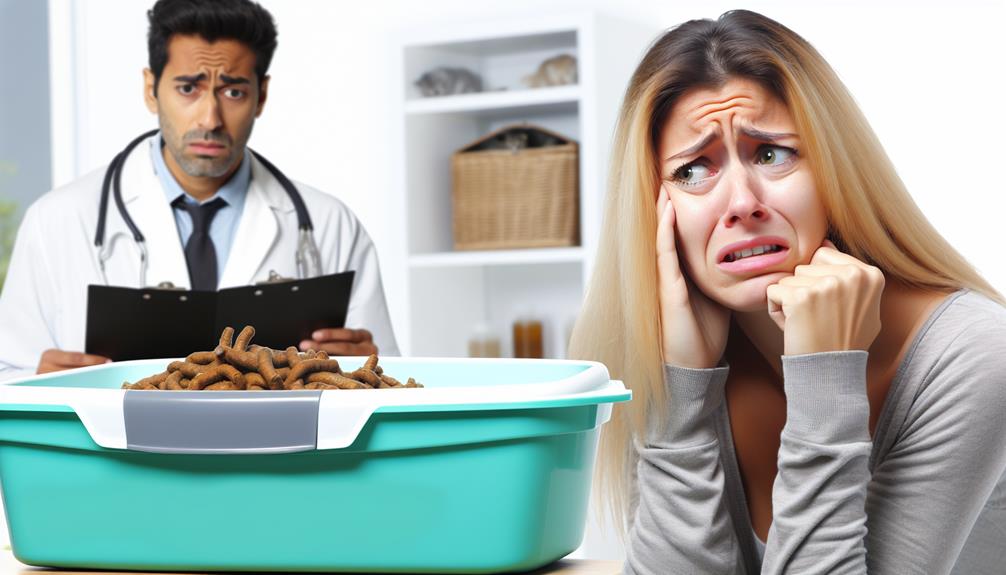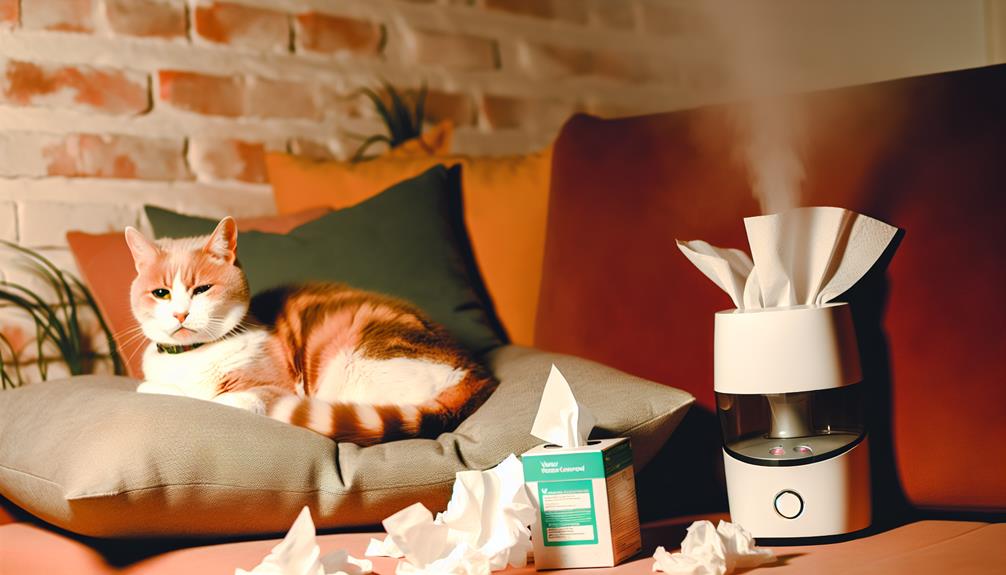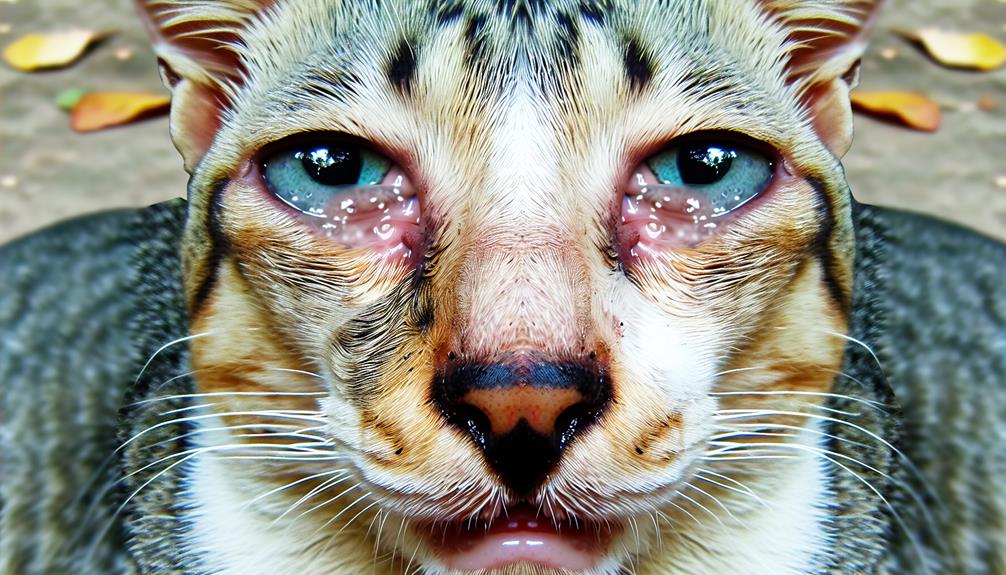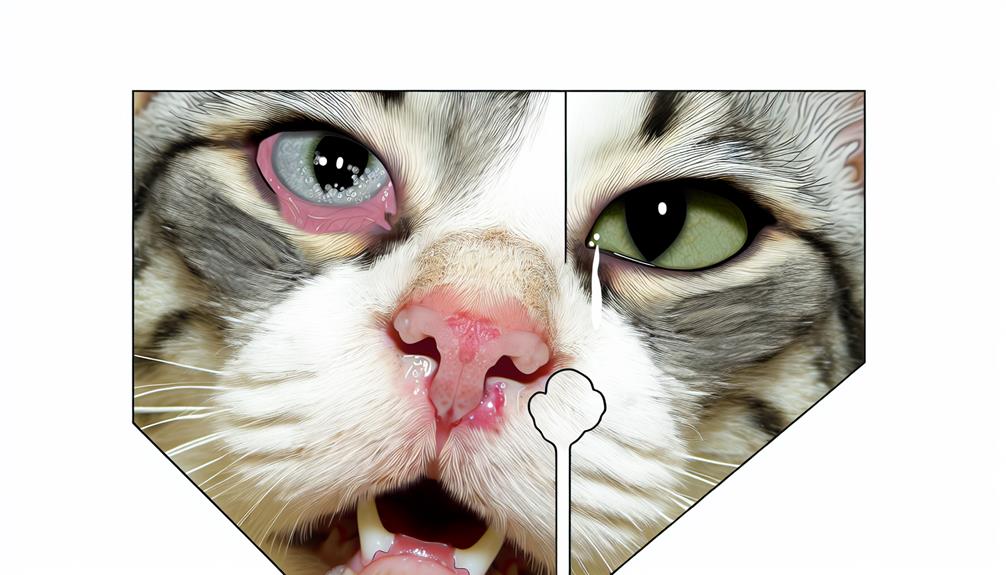Have you ever wondered why your cat's diarrhea doesn't get better, no matter what you try? It can be really frustrating, right? Well, today we're going to explore some possible reasons for this persistent problem and give you some ideas on how to help your furry friend. Maybe there are some things you haven't thought about yet! We'll break down the information into smaller, easier-to-understand parts, so you can really get a grasp on what might be going on with your cat. Let's dive in and find some solutions!
Key Takeaways
Key Takeaways:
- Persistent diarrhea in cats can be caused by various factors, such as changes in their diet or underlying health issues.
- Trying home remedies may help, but if the diarrhea doesn't improve, it's important to see a vet for proper diagnosis and treatment.
- Changing the cat's diet and taking preventive measures can aid in their recovery and prevent future problems.
- Don't hesitate to seek help from a vet if you're concerned about your cat's diarrhea. They have the expertise to provide the right guidance and care.
Possible Causes of Persistent Diarrhea
Why is your cat having persistent diarrhea? Let's explore some possible reasons together. Diarrhea that sticks around for more than a few days can be caused by different things. It's important to figure out what's going on so we can help your furry friend feel better.
One common cause of persistent diarrhea in cats is something called inflammatory bowel disease (IBD). This means their tummy is inflamed for a long time. Food allergies, parasites in the intestines, problems with the pancreas, or certain types of cancer can also lead to ongoing diarrhea.
But wait, there's more! Sometimes, medications can also cause diarrhea in cats. Antibiotics, anti-inflammatory drugs, and certain types of chemotherapy drugs can mess with the good bacteria in their tummy, causing diarrhea.
So, if your cat's got a case of the runs that won't go away, it's important to talk to your vet. They can help figure out the underlying cause and come up with a plan to help your cat feel better. And don't forget, keeping an eye on any medications your cat is taking is also important to catch any potential side effects.
Home Remedies for Cat Diarrhea
Home Remedies for Cat Diarrhea: How to Help Your Furry Friend Feel Better!
Is your cat dealing with diarrhea? Don't worry, there are some simple home remedies that can help bring them relief. While it's always important to consult a veterinarian, these natural remedies can provide some comfort for your furry friend.
- Bland Diet: Feed your cat easily digestible foods like boiled chicken, white rice, or pumpkin puree. These foods can soothe their tummy and firm up their stool. Remember to introduce these foods gradually and keep an eye on how your cat responds.
- Probiotics: Consider adding probiotic supplements to your cat's diet. Probiotics are good bacteria that can restore the balance in their gut and improve digestion. Look for a high-quality probiotic made specifically for cats and follow the recommended dosage.
- Stay Hydrated: Make sure your cat drinks plenty of fresh water. You can even add low-sodium chicken broth to encourage them to drink. Another option is a rehydration solution designed for cats, which can replace lost electrolytes.
Remember, while these home remedies can help, it's essential to keep a close eye on your cat's condition. If the diarrhea continues or gets worse, it's time to seek veterinary care to find and treat the underlying cause.
Taking care of your furry friend is important, and these home remedies can provide some relief for their upset tummy. Just remember to consult a veterinarian and closely monitor their condition. Here's to helping your cat feel better soon!
When to Seek Veterinary Care
When should you take your cat to the vet for diarrhea?
Diarrhea in cats can be a sign of an underlying health issue, so it's important to know when to seek veterinary care. Here are some things to keep in mind:
- Persistent or worsening diarrhea: If your cat's diarrhea doesn't go away or gets worse, it's time to visit the vet. They can help determine the cause and provide appropriate treatment.
- Dehydration risk: Diarrhea can lead to dehydration, which is especially dangerous for cats. Look out for signs of dehydration like increased thirst, decreased appetite, dry gums, lethargy, and sunken eyes. If you notice any of these symptoms, it's crucial to take your cat to the vet right away.
- Regular check-ups: It's important to schedule regular check-ups for your cat with the veterinarian. During these visits, the vet can assess your cat's overall health, perform necessary tests, and address any concerns. This helps catch any potential health problems early on and allows for prompt intervention and treatment.
Dietary Changes to Aid Recovery
How to Help Your Cat's Tummy Troubles: Dietary Changes for Cat Diarrhea
Is your furry friend experiencing tummy troubles? Don't worry, we've got some simple dietary changes that can help your cat feel better. Check out these tips to aid in the recovery of cat diarrhea:
- Probiotics for a Healthy Gut:
- Probiotics are like superheroes for your cat's digestive system.
- They contain good bacteria that can improve gut health and reduce diarrhea.
- You can easily add these supplements to your cat's food or give them separately.
- Rest and Recover with Fasting:
- Just like we need breaks, your cat's tummy needs a rest too.
- Fasting allows the digestive system to heal and recover from inflammation.
- But remember, always ask your vet about fasting periods that suit your cat's health and the severity of the diarrhea.
- Start with Gentle Foods:
- After a fasting period, it's important to slowly reintroduce food to your cat.
- Start with easily digestible options like boiled chicken or plain white rice.
- These bland foods can help calm the digestive system and transition your cat back to their regular diet.
Preventive Measures to Avoid Recurrence
How to Prevent Cat Diarrhea: Tips for a Healthy Digestive System!
Hey there, cat lovers! We all want our furry friends to be happy and healthy, right? Well, one way to keep your cat's tummy in good shape is by preventing diarrhea. Let's learn some easy and practical tips to avoid this messy issue.
- Stick to a Consistent Diet:
- Cats like routine, just like we do. So, it's important to feed them the same high-quality cat food every day.
- Switching their food suddenly can upset their stomachs and lead to diarrhea. So, let's keep it consistent!
- Provide Fresh Water:
- Just like us, cats need to stay hydrated. Make sure to always have clean and fresh water available for your kitty.
- Drinking enough water is essential for a healthy digestive system and can help prevent tummy troubles.
- Keep Stress at Bay:
- Did you know that stress can make your cat's tummy upset? It's true!
- Create a calm and peaceful environment for your cat. Give them a safe space where they can relax and feel secure.
- Regular Vet Check-ups:
- To keep your cat healthy, it's important to take them to the veterinarian regularly.
- The vet can monitor your cat's overall health and catch any potential issues before they become a big problem.
- Don't forget about vaccinations and parasite prevention! They're crucial for a healthy digestive system too.
Frequently Asked Questions
Can Stress or Anxiety Contribute to My Cat's Persistent Diarrhea?
Frequently Asked Questions:
Q: Can stress or anxiety make my cat have diarrhea?
A: Yes, stress and anxiety can actually cause diarrhea in cats. When cats feel stressed or anxious, it can mess with their digestion and lead to tummy troubles. It's important to help your cat feel calm and safe to prevent this from happening.
Q: How can I help my cat if they have stress-related diarrhea?
A: To help your cat, you can create a peaceful environment for them. Make sure they have a quiet space where they can relax and feel safe. You can also try using pheromone diffusers or playing soothing music to help them feel more calm. If the diarrhea persists, it's best to consult your vet for further advice.
Q: Why is it important to address stress and anxiety in cats?
A: Stress and anxiety can not only cause diarrhea but also affect your cat's overall health and well-being. Just like people, cats can feel overwhelmed and upset when they're stressed. By addressing their stress and anxiety, you can help them live a happier and healthier life.
Q: Can I give my cat any medications for stress-related diarrhea?
A: It's important to consult your vet before giving your cat any medications. They will be able to determine the best course of action based on your cat's specific needs. Sometimes, medication may be necessary to help manage your cat's stress and diarrhea, but it should always be done under veterinary guidance.
Q: Are there any natural remedies I can try for my cat's stress and diarrhea?
A: There are some natural remedies that may help your cat feel more relaxed, such as herbal supplements or calming pheromone sprays. However, it's important to remember that not all natural remedies are safe for cats, so it's best to consult your vet before trying anything new.
Q: How long does it take for stress-related diarrhea to go away?
A: The duration of stress-related diarrhea can vary depending on the individual cat and the underlying causes of their stress. In some cases, it may go away within a few days, while in others, it may persist for longer. If your cat's diarrhea continues for more than a few days, it's best to consult your vet for further evaluation and treatment.
Are There Any Specific Breeds That Are More Prone to Chronic Diarrhea?
Frequently Asked Questions About Chronic Diarrhea in Cats
Q: Are certain cat breeds more prone to chronic diarrhea?
A: Yes, some cat breeds are more prone to chronic diarrhea due to genetic factors or specific health conditions. It's important to identify the underlying causes and manage them properly through dietary changes or medication.
Q: What causes chronic diarrhea in cats?
A: Chronic diarrhea in cats can be caused by various factors, including food allergies, intestinal parasites, inflammatory bowel disease, or even stress. Identifying the cause is crucial for effective treatment.
Q: How can I tell if my cat has chronic diarrhea?
A: Chronic diarrhea in cats is characterized by loose, watery stools that persist for more than a few days. It's important to monitor your cat's bowel movements and consult a veterinarian if you notice this ongoing issue.
Q: Can chronic diarrhea be treated?
A: Yes, chronic diarrhea in cats can be treated. The treatment depends on the underlying cause. It may involve dietary changes, medication, or addressing any other health issues contributing to the problem.
Q: Is chronic diarrhea dangerous for cats?
A: Chronic diarrhea can be concerning for cats because it can lead to dehydration, weight loss, and nutrient deficiencies. It's important to consult a veterinarian to determine the cause and appropriate treatment to prevent any complications.
Q: Can I prevent chronic diarrhea in my cat?
A: While it may not always be possible to prevent chronic diarrhea, you can take steps to minimize the risk. This includes providing a balanced diet, regular veterinary check-ups, keeping your cat's environment clean, and managing stress levels.
Q: Should I be worried if my cat has occasional diarrhea?
A: Occasional diarrhea can happen to cats, and it's usually not a cause for immediate concern. However, if the diarrhea persists or becomes chronic, it's best to consult a veterinarian to rule out any underlying health issues.
Q: Can I help my cat's chronic diarrhea at home?
A: It's important to consult a veterinarian for proper diagnosis and treatment of chronic diarrhea in cats. While there are some home remedies that may provide temporary relief, they are not a substitute for professional veterinary care.
Can Certain Medications or Supplements Cause Diarrhea in Cats?
Frequently Asked Questions:
Q: Can certain medications or supplements make cats have diarrhea?
A: Yes, some medications or supplements can cause diarrhea in cats. It's like when you eat something that doesn't agree with your stomach and you get a tummy ache. Cats can have the same problem with certain medicines and supplements.
Q: Can changing a cat's diet cause diarrhea?
A: Yes, changing a cat's diet suddenly or introducing new foods can upset their stomachs and give them diarrhea. It's important to introduce new foods slowly, so their tummies have time to adjust. Just like if you ate a whole bunch of new foods all at once, it might make your tummy feel funny.
Q: Why do medications and diet changes give cats diarrhea?
A: Medications and diet changes can upset a cat's digestive system, causing diarrhea. Just like when you eat something that doesn't agree with your tummy, it can make things move too quickly through the intestines and result in diarrhea. It's like your cat's tummy is saying, "Whoa, too much too fast!"
Q: What can I do if my cat has diarrhea from medications or diet changes?
A: If your cat has diarrhea from medications or diet changes, you can try giving them a bland diet of boiled chicken and rice for a few days. This can help settle their stomachs and firm up their poop. It's also a good idea to talk to your vet, who can give you advice on what to do next.
Q: Is diarrhea from medications or diet changes serious?
A: In most cases, diarrhea from medications or diet changes is not serious and will go away on its own. However, if your cat has diarrhea for more than a couple of days, or if they seem really sick or in pain, it's important to contact your vet. They can check to make sure there isn't a bigger problem going on.
Q: How can I prevent my cat from getting diarrhea from medications or diet changes?
A: To prevent your cat from getting diarrhea from medications or diet changes, it's important to introduce new foods slowly and gradually. This gives their stomachs time to adjust. If your cat needs to take medication, talk to your vet about any potential side effects and what you can do to minimize them.
Is It Possible for My Cat's Diarrhea to Be a Symptom of a More Serious Underlying Condition?
Frequently Asked Questions about Cat Diarrhea
Q: Why does my cat have diarrhea?
A: Diarrhea in cats can happen for many reasons, like eating something weird or having a sensitive tummy. Sometimes, it can be a sign of a more serious problem, so it's important to figure out the cause.
Q: Is diarrhea in cats normal?
A: No, diarrhea is not normal for cats. It's their body's way of saying something is off. If your cat has diarrhea, it's a good idea to talk to a vet to find out why.
Q: Can my cat's diarrhea be a sign of something serious?
A: Yes, it's possible. Diarrhea can be a symptom of a more serious health issue, like an infection, intestinal problem, or even a disease. It's important to get it checked out.
Q: How can I help my cat with diarrhea?
A: If your cat has diarrhea, it's best to take them to the vet. They can figure out the cause and give you advice on how to treat it. It's important to keep your cat hydrated and not give them any human medicine without talking to the vet first.
Q: What can I do to prevent my cat from getting diarrhea?
A: To help prevent diarrhea, make sure your cat eats a healthy diet and doesn't eat anything they shouldn't. Keep their litter box clean, and make sure they always have fresh water available. Regular check-ups with the vet can also catch any potential problems early on.
Q: How long does cat diarrhea usually last?
A: The length of time diarrhea lasts in cats can vary. Sometimes it goes away on its own in a day or two, but if it lasts longer than that, it's a good idea to talk to a vet. They can help figure out why it's happening and how to make it stop.
Q: Can I give my cat any medicine for diarrhea?
A: It's important to talk to a vet before giving your cat any medicine for diarrhea. Some human medicines can be dangerous for cats. The vet can recommend safe options or prescribe medication if needed.
Can Changing My Cat's Litter or Litter Box Type Affect Their Bowel Movements?
Frequently Asked Questions about Changing Your Cat's Litter or Litter Box Type:
Q: Can changing my cat's litter or litter box type affect their bowel movements?
A: Yes, it can. Some cats may have sensitive stomachs and certain types of litter might cause digestive issues like diarrhea. It's best to talk to a vet if you're thinking of making a change.
Q: Why would changing the litter or litter box type affect my cat's bowel movements?
A: Different types of litter may have ingredients that don't agree with your cat's stomach. This can lead to upset stomachs and changes in their bowel movements.
Q: What should I do if my cat has diarrhea after changing the litter or litter box type?
A: If your cat has diarrhea after a litter change, it's important to consult with a vet. They can help determine if it's the litter causing the issue or if there's another underlying problem.
Q: How can I prevent my cat from having bowel issues when changing litter or litter box type?
A: To minimize the chances of bowel issues, it's a good idea to gradually transition your cat to the new litter or litter box type. Mix a small amount of the new litter with the old one, and gradually increase the ratio over time.
Q: Can I switch my cat's litter or litter box type without any problems?
A: Some cats may have no issues with switching litter or litter box types, while others may be more sensitive. It's always best to monitor your cat's behavior and bowel movements after making a change.
Q: Are there any signs I should look out for if my cat is having problems with the new litter or litter box type?
A: Yes, keep an eye out for signs like diarrhea, vomiting, or changes in litter box habits. If you notice any of these, it's important to seek veterinary advice.
Conclusion
So remember, if your cat has persistent diarrhea, it could be caused by different things like changes in their diet or health problems. While you can try some home remedies, it's important to see a vet if it doesn't get better. They can diagnose the problem and give the right treatment. Changing their diet and taking preventive steps can help them recover and avoid future issues. Don't hesitate to reach out to a vet for help. Share your thoughts or learn more about cat diarrhea by talking with your vet today!




